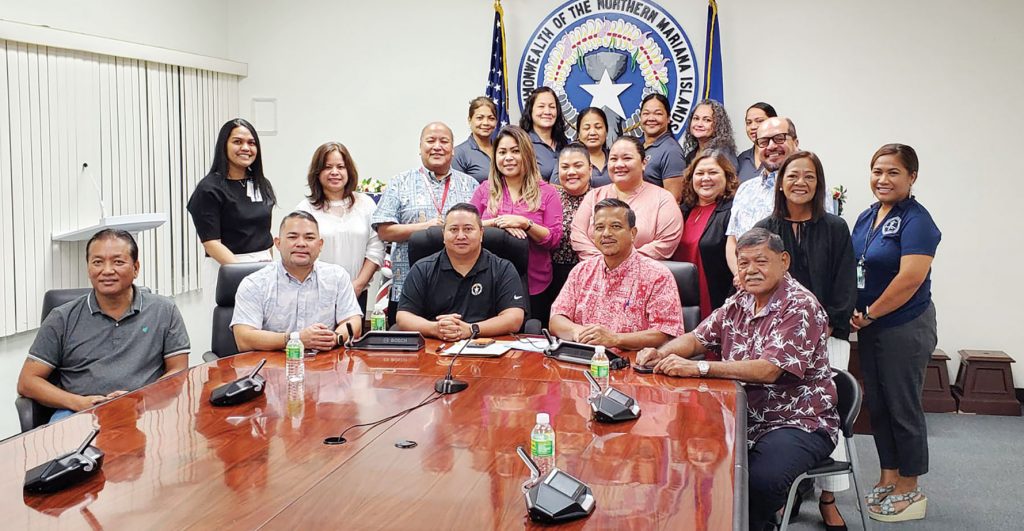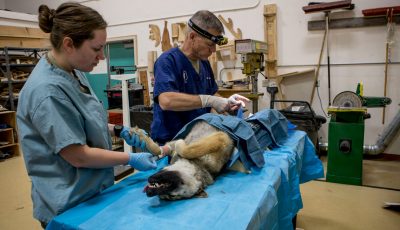New law creates five behavioral health professional scholarships

Gov. Ralph DLG Torres, sitting in the middle, and Senate President Jude U. Hofschneider (R-Tinian), to the governor’s left, pose for a group photo with officials and staff from the Community Guidance Center, Public Health, Northern Marianas College, and CNMI Scholarship Office. Also in the photo, sitting from left to right, are Sens. Francisco Q. Cruz, Vinnie Vinson F. Sablan, and Victor B. Hocog. (FERDIE DE LA TORRE)
Gov. Ralph DLG Torres signed into law yesterday a bill that will establish a Behavioral Health Professional Scholarship in the CNMI to address the shortage of behavioral health professionals among U.S. citizens or permanent residents in the Commonwealth.
Behavioral health professionals refer to psychologists, psychiatrists, therapists, counselors, social workers, and substance abuse professionals.
Torres signed Senate Bill 22-05, SS1, HD1, into Public Law 22-24, in front of Senate President Jude U. Hofschneider (R-Tinian), who is the author of the legislation.
The governor said this bill creates behavioral health professional scholarship for five eligible students who aspire to obtain a master’s degree in a behavioral health field.
He said $10,000 shall be allocated for each master’s degree scholarship per annum per student enrolled in a graduate program at a college or university in the U.S. or its territories or at any Western Interstate Commission for Higher Education partner institution for a period of up to two years.
In exchange, scholarship recipients must return to the CNMI and work at the Commonwealth Health Center, Community Guidance Center, Tinian Health Center, Rota Health Center, or in the Public School System for a certain period of years.
Under the bill, the CNMI Scholarship Office shall administer the behavioral health professional scholarship.
Also present at the signing were Sens. Vinnie Vinson F. Sablan (R-Saipan), Victor B. Hocog (R-Rota), and Francisco Q. Cruz (R-Tinian).
Among those who attended the signing of the bill into law were Northern Marianas College president Dr. Galvin Deleon Guerrero, Commonwealth Healthcare Corp.’s Commonwealth Guidance Center director Joseph Kevin Villagomez, clinical psychologist Dr. Glenda George, and other CGC, public health, and NMI Scholarship officials and staff.
Hofschneider said this legislation is a work product not just by the Senate or himself, but by a lot of people from CGC, Scholarship Office, and school counselors.
Hofschneider first introduced similar legislation in September 2020. He then introduced Senate Bill 22-05 in January 2021. The House of Representatives passed it on Aug. 29, 2022, with some amendments. The Senate accepted the amendments and passed the legislation on Sept. 23, 2022.
Hofschneider said he got a lot of guidance from Dennis Mohatt, who is the Western Interstate Commission for Higher Education vice president for behavioral health.
He said what really inspired him to push this legislation is when he saw the growing need for behavioral health professionals not only in the U.S. mainland, but especially on the islands.
“…Although you guys are there already doing it and you’re doing all your best, there’s always that crack in the service,” he said.
Hofschneider said he is grateful that they got the support of CGC, public health, and NMC, and also from his colleagues in the Senate and House.
“…The idea is to build capacity in the CNMI,” he said.
The president also thanked Torres for considering this legislation because the financial side of things is a legitimate concern.
Deleon Guerrero said that, as Sablan and Hocog earlier pointed out, mental health used to be a dirty secret. “Growing up, like when someone says, ‘Oh, that guy’s mental,’ it was such a negative condemnation,” Deleon Guerrero said. He said he believes that the COVID-19 pandemic and the people’s experience with strong storms have awakened their awareness to this important issue.
At a practical level, Deleon Guerrero said, this legislation helps the CNMI meet the needs of the community when it comes to mental health.
He said on a symbolic level, by signing this legislation into law, the governor elevates the value of mental health.
“And that is critically important for our community so that when we run into someone, and they feel ashamed, maybe this will lift that shame, and give people the empowerment that they need to seek the help,” he said.



























